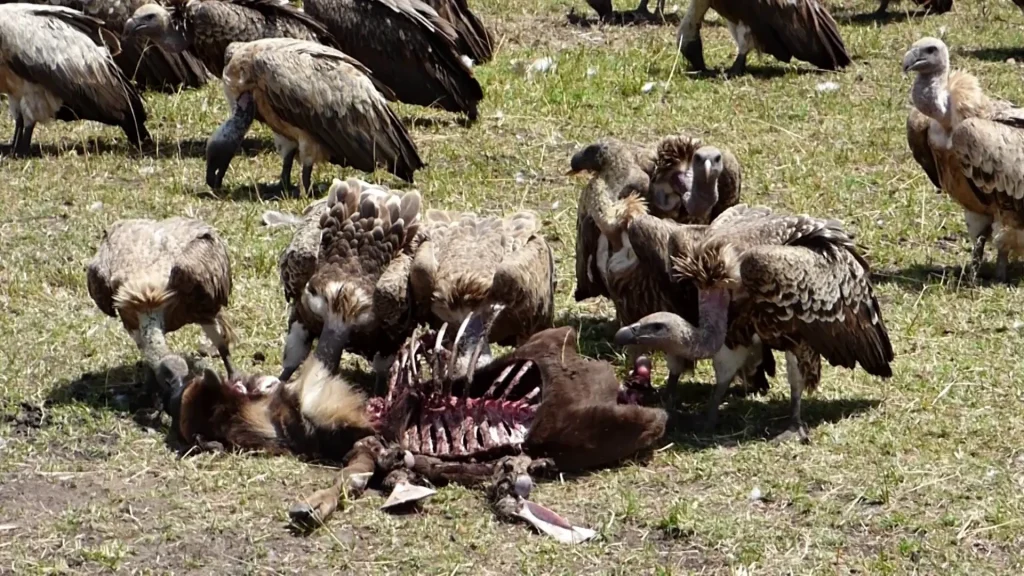Nature’s Cleanup Crew: Animals that Consume Dead Animals

Nature's Cleanup Crew Animals that Consume Dead Animals
Introduction
In the vast tapestry of the natural world, various creatures play critical roles in maintaining ecological balance. Among these are animals that specialize in consuming dead animals, often referred to as scavengers. These unsung heroes of the animal kingdom serve as nature’s cleanup crew, playing a vital role in recycling nutrients and preventing the spread of diseases. In this blog, we will explore some of the most intriguing scavengers, their unique adaptations, and the invaluable service they provide in the ecosystem.
Vultures: Nature’s Cleanup Specialists
Vultures are perhaps the most iconic scavengers, known for their keen sense of smell and sight, which allows them to locate carrion from high above. These large birds primarily feed on the carcasses of dead animals, playing a crucial role in the rapid decomposition process. By consuming carrion that may otherwise attract disease-carrying organisms, vultures help maintain a healthier ecosystem.
Hyenas: Masters of Adaptation
Hyenas are remarkably adaptable scavengers, mainly inhabiting regions across Africa and parts of Asia. With strong jaws and teeth capable of crushing bones, hyenas can access the nutritious marrow within carcasses that other animals cannot. While often perceived as ruthless predators, hyenas rely heavily on scavenging for their sustenance, making them essential members of the ecosystem’s cleanup crew.
Carrion Beetles: Beneath the Surface
Not all scavengers are large and conspicuous. Carrion beetles, also known as burying beetles, are small insects that play a vital role in the decomposition of dead animals. They locate and bury small carcasses, such as rodents or birds, in the ground. By doing so, they create an environment that promotes decomposition while also providing a food source for their young.
Ravens and Crows: Intelligent Scavengers
Ravens and crows are incredibly intelligent birds that have earned a reputation for their clever problem-solving abilities. While they are known to hunt live prey, they are equally skilled at scavenging. Their opportunistic nature allows them to feed on a wide variety of food sources, including the remains of dead animals.
Sharks and Scavenging on the Ocean Floor
In the vast depths of the oceans, scavenging takes on a whole new dimension. Sharks play an essential role in maintaining the balance of marine ecosystems by consuming dead animals that sink to the ocean floor. These apex predators are equipped with a powerful sense of smell, which enables them to detect the faintest traces of carrion in the vast expanse of the ocean.
Opossums: Nighttime Cleaners
Opossums are nocturnal creatures that contribute significantly to the cleanup of the environment. They feed on carrion, as well as insects and fruits, making them adaptable scavengers. Opossums also consume ticks, which helps control the population of these disease-carrying parasites, benefiting both the environment and human health.
Wolves and the Circle of Life
Wolves are apex predators, but they also have a role to play in the scavenging process. In ecosystems where they exist, wolves often leave behind remains of their kills after they have eaten their fill. These remains become an essential food source for scavengers like ravens, eagles, and smaller carnivores, closing the circle of life and waste recycling in the ecosystem.
Conclusion
In the intricate web of life, animals that consume dead animals serve a crucial purpose as nature’s cleanup crew. From the skies to the depths of the oceans, these scavengers play a pivotal role in the efficient recycling of nutrients and the prevention of disease spread. Their unique adaptations and contributions are a testament to the delicate balance of the natural world.
Understanding and appreciating the vital role of scavengers in ecosystems can inspire us to respect and protect these creatures and the habitats they depend on. Preserving the diversity of scavengers ensures the continued health and stability of our planet’s intricate ecological systems for generations to come. So, the next time you encounter a vulture soaring high above or a crow cleaning up in your neighborhood, remember their invaluable role in maintaining the harmony of the natural world.
For More Related Articles Browse Our Website Blogster.pk
For social Connection You can also Visit and follow our Social media Platforms
Facebook , Instagram, Linkedin, Pinterest, Quora, Twitter, Youtube.







